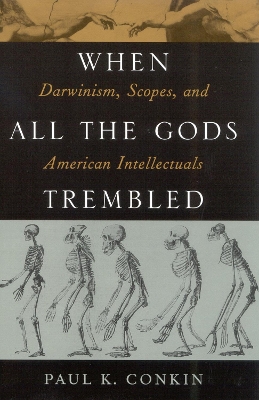With characteristic eloquence and insight, prominent historian Paul K. Conkin explores large, indeed cosmic issues in When All the Gods Trembled. Conkin focuses his analysis on the numerous challenges in the late nineteenth and early twentieth century to age-old beliefs in the existence of a god, in a world that exhibits some extrinsic or intrinsic purpose, in the divine origin and special destiny of humans, and in transcendent moral values. By the 1920s, these challenges had created a major crisis of faith. Conkin traces the origins of Western beliefs about the gods and about human origins, beliefs shared by the three great Semitic religions. He proceeds with a searching and original analysis of Charles Darwin's Origin of Species, rejecting conventional understandings of Darwin in order to probe the logical credentials of his thesis and its implications for Christian theology. From Darwin he moves to the deep rifts that developed between American orthodox, evangelical, and fundamentalist Christians on the one hand and liberals and modernists on the other. These tensions created the enormous public interest in the Scopes trial of 1925, which provides the subject of a revealing chapter. The final two chapters focus on the intellectual debates during and immediately after the famous trial. One involves a dialogue among the most representative and vocal Christian intellectuals in the 1920s-the orthodox E. Gresham Machen, the liberal Harry Emerson Fosdick, and the modernist Shailer Matthews. The last chapter includes brief vignettes of a diverse group of intellectuals who rejected any version of theism, including John Dewey, George Santayana, Harry Elmer Barnes, John Crowe Ransom, Walter Lippmann, and Joseph Wood Krutch. Conkin's survey reveals a degree of the public's disillusionment with American intellectuals during this critical period. The fundamental themes of Western civilization were crumbling, and Americans had to give up on one consoling certainty after another. The loss was great and the possible gains for humanity unsure and precarious. Yet most American intellectuals failed to provide either a deep analysis of the issues at stake or more than myths and fictions to replace the spiritual loss. While recognizing this failure, Conkin eschews any facile condemnation, appreciating how poignant and even tragic were the dilemmas faced by the first generation of intellectuals to confront a world that seemed to exhibit no preordained goal, and provide no promise of human redemption.
- ISBN10 0847690644
- ISBN13 9780847690640
- Publish Date 26 August 2001
- Publish Status Active
- Publish Country US
- Imprint Rowman & Littlefield
- Format Paperback
- Pages 208
- Language English
